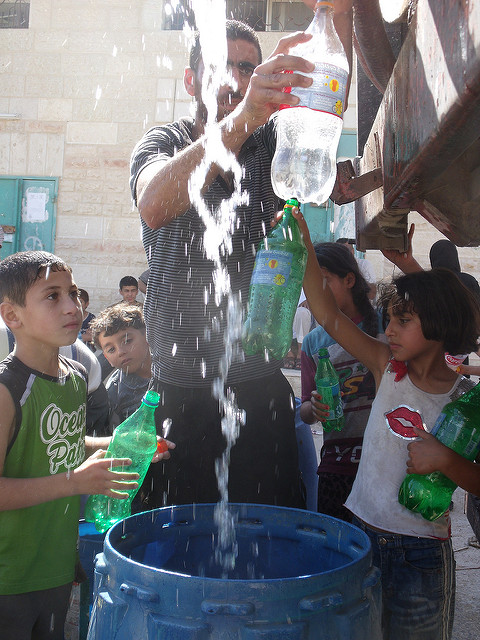
I Qarawat Bani Zaid -landsbyen, som ligger i Ramallah-distriktet er det stor vannmangel. Foto: ISM Palestine
Marian Willuhn
Israel is claiming to follow international law when it comes to the sharing of water. As an occupier Israel is according to the Geneva convention responsible for the wellbeing of the occupied population, such as the human right to water and sanitation. Israel also claims to adhere to The Transboundary Watercourse Convention, a position that rests upon a dubious interpretation.
Disproportional allocation of water
In May, Fivas reported on the difficult question of water allocation between Israel and Palestine, and the effect that the Palestinian Authority (PA) is granted very limited access to the water resources of the region. Israel obtains 483 million cubic metres per year (mcm/y) while the PA is granted merely 118 mcm/y.
Israel maintains to act within international law regulating the use of shared water resources and holds up several principles that allegedly protect the disproportional allocation of water in the region. Israel rests a large part of its case for obtaining disproportionally higher quantities of water on the principle of prior appropriation. Furthermore Israel holds that their duties according to the Geneva Convention are limited. Israel denies being a belligerent occupier of the West Bank which jettisons human rights obligations Israel otherwise has to fulfil. These two principles are the result of the development of the conflict around water and land and have been in place for many decades. The Oslo Accords regulating among many other things the use of water between Israel and the PA are a direct result of these legal principles.
Historic use does not give right
The central content of the Transboundary Watercourse Convention is the principle of equitable and reasonable sharing of water resources among riparian states as codified in Articles 5 & 6 of the convention. Equitable and reasonable as conditioned in Art.: 6 does not entail an equal allocation of water, but requires riparian states to allocate according to considerations of population size dependent on the watercourse in question, existing and potential uses, conservation of the resources quality and socio-economic considerations. This principle of ‘existing and potential use’ is what Israel is quoting to show that they have a right to extract more water. The principle is also known as the ‘historic use’ principle. The Convention prima facie recognises the unequal allocation of water between Israel and the Palestinian Authority (PA) based on the ‘existing and potential use’ regulation. But the principles set out in the Art.: 6 are not ranked, and the ‘existing and potential use’ must therefore be considered in consort with the other principles, such as socio-economic considerations. Art.: 6 also states clearly that the different qualitative parameters – to determine what equitable in each and every case means–have no hierarchy but are to be applied in a suitable fashion for each scenario.
The qualitative thresholds of each of the factors are not meticulously set out in the Convention, as the Convention’s authors sought to leaving this intentionally open in order to be adaptable to the different scenarios that the worlds different shared river basins offer. The International Law Commission (ILC), however in its commentary – as well as legal scholars – clearly conceded that the protection of prior appropriation of water courses, was not to be used in a dipositive fashion. This seriously challenges the notion that Israel’s water allocation is based on international law, as they are resting their position entirely on the ‘historic use’ principle of the Convention while disregarding all the other factors in this calculation, rendering the application of the Convention contrary to its object and purpose.
Significant harm to human health and safety
Most important for the limited disposition of Article 6 are the limitations resulting from Articles 7 & 10, preventing to cause significant harm to another riparian and placing above all the fulfilment of vital human needs. Sufficient commentary has been produced by the ILC to subject that claim of prior appropriation to considerations of the no harm principle. Additionally, the no harm principle expands the scope from an individual Human Right to Water and Sanitation, to a collective right as a social group i.e.: Palestinians, to access water for socio-economic development. The UN’s special rapporteur on water at the time of crafting the Convention, in his communications conceded to the fact that this is the exact object and purpose of the no harm principle.
Applying the principle of ‘existing and potential use’ in this particular fashion significantly decreases the motivation to use the convention to settle disputes. The relationship between the material and normative contents of the Art.:5,6,7&10 was specifically designed by the authors of the Convention to incentivise dispute settlement within the frames of international law, by avoiding predetermined water dispositions. Furthermore, uses that produce significant harm to human health and safety are according to the ILC – inherently inequitable and unreasonable, thereby failing to adhere to the precepts of the convention. The current unequal allocation is mentioned as the main impediment to the Palestinian Human Right to Water and Sanitation by the PA and relevant scholarly contributions, thus fulfilling the standard of significant harm. In this sense compliance with the contents of the watercourse convention can only be attained if the allocation is revised.
Israel dodging the international covenants
Unfortunately, the International Court of Justice (ICJ) has only adjudicated the Convention in part but, and there are insufficient international complaints and enforcement mechanisms. The ICJ for example will hear cases only if both parties agree to the ICJ’s jurisdiction on the matter, giving states with a high degree of national interest the power to entirely disclaim the authority of the court.
Furthermore, the occupation of the West Bank and the general re-occurring level of military escalation of the conflict allows for humanitarian law as a legal regime to be applied.
The Geneva Convention (IV) Relative to the Protection of Civilian Persons in Times of War Additional Protocol (I) (hereafter: the Fourth Geneva Convention) holds that a belligerent occupying power is under the obligation to fulfil the human rights claims of the occupied population. Important here is the fact of belligerent (hostile) occupation, as the Convention only applies if this belligerent status can be established.
While the International Court of Justice, the UN General Assembly and the UN Security Council have consistently maintained the position that Israel falls under this category and being subject to direct human rights obligations towards the Palestinian population as codified in the Fourth Geneva Convention including the access to clean drinking water in sufficient quantities, quality, accessibility and affordability, Israel however maintains a different position.
Whether, or not the Fourth Geneva Convention is applicable in this case is reliant on the qualitative threshold of establishing that Israel is de jure a belligerent occupying force. Israel claims that it falls short of being under jurisdiction of the Geneva Conventions in this case as it does not fulfil the legal threshold of being a belligerent occupier. The reason for not fulfilling this requirement comes, according to Israel’s supreme court from the fact that prior 1967 the West Bank had no formal sovereignty, hence Israel has not obtained power from any sovereign power in a belligerent fashion.
Limits the governments responsibility in Palestine
Since 1967 the West Bank and Gaza are militarily occupied by Israel resulting from the 6-day war against several Arab nations. Israel’s government at the time established military tribunals to try Palestinians accused of security offences. The order by which the military tribunals were enacted clearly stated that the tribunals were to operate under the Fourth Geneva Convention, establishing that Israel itself recognized that it had been a belligerent occupier at the time. Political, academic and legal voices within Israel briefly after the 1967 War contested the notion that West Bank and Gaza were in fact occupied territories, by claiming that the status of West Bank and Gaza was unclear, prior to the acquisition. Concurring with these suggestions, Israel revoked this status and established that the West Bank and Gaza were not legally occupied territories, shortly after the war. Irrespective of the status change, Israel’s government conceded that the Fourth Geneva Convention be the applicable source of law for legal issues pertaining to the occupied territories and whenever in doubt. Additionally, Israel’s government conceded that all IDF soldiers in the territory operate under the humanitarian principles of the Geneva Conventions.
After a wave of petitions to Israel’s supreme court; the court established that the occupation is not in fact of belligerent nature but assumed its own jurisdiction over the occupied territories with regard to the military and other governmental bodies. This means that the court can adjudicate matters of military misconduct by IDF soldiers, but does not properly recognise Israel’s governmental obligation to realise the human right to water in Palestine.
Again, even though the international courts and bodies are rather clear on their judgement that Israel is a belligerent occupier, enforcement and sanction mechanisms are not that well developed and misconduct in international law often results in little more than a written recognition of the misconduct by the ICJ or the human rights commission. Still these institutions are important in setting a norm by these judgements and assessments.
After that it is up to the rest of us to act on the knowledge.

